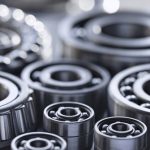Common Causes of Roller Bearing Failure and How to Prevent Them
September 11, 2023 2:45 pm Leave your thoughts Roller bearings are crucial components in many industrial machines and equipment. They facilitate smooth movement and reduce friction between rotating parts. However, like any mechanical component, roller bearings can fail over time due to various factors. Understanding the common causes of roller bearing failure and implementing preventive measures can help prolong their lifespan and ensure optimal performance. In this blog post, we will explore some common causes of roller bearing failure and discuss ways to prevent them.
Roller bearings are crucial components in many industrial machines and equipment. They facilitate smooth movement and reduce friction between rotating parts. However, like any mechanical component, roller bearings can fail over time due to various factors. Understanding the common causes of roller bearing failure and implementing preventive measures can help prolong their lifespan and ensure optimal performance. In this blog post, we will explore some common causes of roller bearing failure and discuss ways to prevent them.
1. Insufficient Lubrication
One of the primary causes of roller bearing failure is insufficient or improper lubrication. Insufficient lubrication leads to increased friction, heat, and wear, which can result in premature failure. To prevent this, it is crucial to follow the manufacturer’s guidelines regarding lubrication intervals and the type of lubricant to be used. Regularly monitor the lubrication levels and ensure proper lubrication to maintain the bearings’ optimal functioning.
2. Contamination
Contamination is another common cause of roller bearing failure. Dust, dirt, and debris can enter the bearing, causing abrasive wear and damage. To prevent contamination, it is essential to have effective sealing mechanisms in place. Regularly inspect and clean the surrounding area to minimize the risk of particle ingress. Additionally, consider using proper filtration systems to reduce airborne contaminants within the working environment.
3. Improper Installation
Improper installation can significantly impact the performance and longevity of roller bearings. Over-tightening or under-tightening the bearing can lead to excessive preload or insufficient load, causing premature wear or failure. It is crucial to follow the manufacturer’s installation instructions precisely. Proper tools and techniques should be employed to ensure correct fitment and alignment. Consulting with experts or referring to technical resources can help ensure accurate installation procedures are followed.
4. Overloading
Overloading is a common cause of roller bearing failure, particularly in high-load applications. Excessive loads can lead to increased stress and fatigue, resulting in premature failure. Understanding the bearing’s load capacity and operating within its limits is vital. It is advisable to consult the manufacturer or a bearing specialist to determine the appropriate bearing size and type for specific applications. Regular monitoring of the loads and implementing load-balancing measures can help prevent overloading.
5. Incorrect Maintenance Practices
Improper maintenance practices can contribute to premature roller bearing failure. Neglecting routine inspections, lubrication, and cleaning can lead to the accumulation of contaminants, inadequate lubrication, and increased wear. Following a proper maintenance schedule and adhering to recommended maintenance procedures are essential. Regularly inspect the bearings for signs of wear or damage, clean them as required, and ensure proper lubrication at prescribed intervals.
6. Misalignment
Misalignment occurs when the shaft and bearing are not properly aligned or parallel. This can result in increased forces, uneven distribution of loads, and excessive wear on the bearing surfaces. To prevent misalignment-related failures, ensure that the shaft and bearing are properly aligned during installation. Periodically check for misalignment and make necessary adjustments as required. Using alignment tools and consulting with experts can help ensure accurate alignment.
7. Poor Handling and Storage
Improper handling and storage can cause damage to roller bearings before they even enter service. Mishandling, dropping, or applying excessive force during transportation or storage can result in deformations or other forms of physical damage. It is crucial to follow proper handling procedures, including using appropriate lifting equipment and protecting bearings from dirt, dust, and moisture during storage. Storing bearings in temperature-controlled and clean environments can help prevent unnecessary damage.
Conclusion
Understanding the common causes of roller bearing failure and implementing preventive measures can significantly extend their lifespan and improve their performance. Adequate lubrication, contamination prevention, proper installation, load management, correct maintenance practices, alignment, handling, and storage are key factors in ensuring the longevity and reliability of roller bearings. By addressing these factors proactively, you can minimize the risk of roller bearing failure and optimize the efficiency of your industrial machines and equipment.
Got Questions? Let Us Help!
Welcome to M.B. McKee Company, Inc. M.B. McKee Company, Inc. has been serving our local community of Lubbock since 1943. Locally owned and family operated, we provide great customer service and solutions for ongoing issues. With over 70 years of experience, our products, services, and engineering will always exceed your expectations. Our products include bearings, belts, chains, conveyor systems, gearing, lifts, motors, drives, product separation, tools, valves, and fittings. Our engineering division also provides general formulas, NEMA motor frames, elevator legs, screw and belt conveyors, lift charts, components from Baldor and Flexco, and various interchangeable parts. Contact us today to learn more about what we can do for you!
Categorised in: Cotton Gin Components
This post was written by admin

